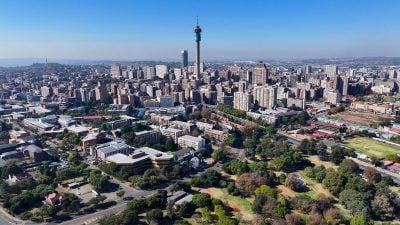The wearing of face masks to protect against Covid-19 is now compulsory in Nigeria. Linus Unah reports on how local tailors have been working to meet the demand
Before the coronavirus pandemic struck, medical masks in Nigeria were largely the preserve of healthcare professionals.
But the needs of healthcare workers and citizens have prompted widespread demand for items of personal protective equipment (PPE), especially since President Muhammadu Buhari ordered the compulsory wearing of face masks and coverings in public.
Given the huge gap between demand and supply, Buhari has urged state authorities, businesses and philanthropists to support the production of cloth masks for citizens. In addition, the Presidential Taskforce on Covid-19 encouraged local tailors to start producing face masks in large quantities using local fabrics.
The WHO says that wearing a medical mask is one of the prevention measures that can limit the spread of certain respiratory viral diseases, including Covid-19. However, it says that the use of a mask alone is insufficient to provide an adequate level of protection, and other measures, including handwashing, are essential. Non-certified masks may not provide adequate levels of protection from the virus.
Abia state forges ahead
In Nigeria’s southeast, the Abia state government has responded to the president’s call to action.
Governor Okezie Ikpeazu provided a grant of N12m ($30,810) to 100 local tailors to start producing masks ahead of a surge in demand, and the State Marketing and Quality Management Agency is working with tailors to ensure they meet pre-approved standards.
The state authorities have distributed tens of thousands of masks to local churches and mosques alongside food items, money and sanitisers. The Abia Marketing and Quality Management Agency (AMQMA) aggregates demand from drugstores, supermarkets, traders, NGOs and large businesses throughout Nigeria and takes the orders to garment factories and clusters of tailors.
The tailors produce surgical masks and cheaper cotton fabric-based face coverings, which may be less effective. Three-ply masks, certified by the Standards Organisation of Nigeria, usually undergo ultraviolet sterilisation before they are packaged and shipped nationwide to distributors.
Using the hashtag #MadeInAba, officials are marketing the masks and attracting buyers on Twitter and Facebook. By the end of April, the AMQMA announced that it had delivered 1m masks to 20 states and paid more than N200m to 1,000 tailors who went on to create additional employment for 2,000 workers.
For several decades, Aba, the commercial hub of Abia state, has been known for its economic vibrancy. The city is home to the large, bustling Ariaria International Market where producers of footwear, leatherwork and a thriving garment cluster attract customers from different parts of Nigeria.
Boosting the local economy
Besides masks, tailors in Aba are pouring their energy into making personal protective equipment (PPE), including waterproof overalls for health workers, and have received orders from health facilities.
“Instead of complaining and blaming, we decided to take action and see the ways of bridging the gap,” Ikpeazu said during a local TV interview. “This is an opportunity for our tailors to make some money and help boost our economy in Abia.”
Outside Aba, the production of cloth masks is picking up heavily. State officials are encouraging local tailors to ramp up production, even if some of the end products appear to be of dubious utility. In Lagos, tailors have resorted to making reusable face coverings using local fabrics and distributing them to retailers to sell to residents. A single mask can cost N500 or more.
Urgent demand
Olowe Teniola, the owner of Moteny Couture, a small tailoring business in Ikorodu on the outskirts of Lagos, is under intense pressure to meet urgent orders.
Teniola has made about 10,000 face masks for five businesses and continues to produce smaller packages for retailers. Her masks cost N300-700 and her daily production capacity is around 2,000. She has hired three extra staff and now has a 10-strong workforce. But she laments that a lack of stable power supply makes her work difficult.
“The pressure is too much and most companies and traders want the masks urgently,” she says, adding that her shop sometimes operates for up to 72 hours non-stop.
Similarly, the Nigerian Air Force Investments Limited (NAFIL), which runs tailoring facilities in Kaduna and Port Harcourt, has turned to making affordable masks for N150 each. NAFIL’s managing director Uche Nwagwu told the Business Day newspaper that they have produced about 38,000 face masks and employed over 100 citizens.
About 230km east of NAFIL’s factory in Port Harcourt is the state-owned Cross River Garment Factory in the capital city of Calabar. The factory has sourced local fabrics from Aba and has the capacity to produce 100,000 units daily. State officials say they have received orders of more than 1.2m masks from officials in Lagos, Kano and Benue as well as from businesses and supermarkets.
In Lagos, state officials are using the #MaskUpLagos initiative to enforce compulsory wearing of face covering in public. The state said it will produce and distribute 3m masks to vulnerable households.
In the Muslim-majority north, citizen-led initiatives are sharing photos of influential traditional and religious leaders wearing masks on social media. This has spurred more dwellers in the region to take to wearing masks.
In Kebbi, in northwestern Nigeria, state officials have trained 100 women drawn from 21 local councils to make reusable cloth face masks to empower the women to earn during this period.
Helping the vulnerable
But not everybody can buy a mask during a time when prices have soared three-fold and profiteers have spied an opportunity.
The University of Ibadan in Nigeria’s southwest has stepped in to cater for low-income earners. It has produced 2,000 double-layered, reusable face masks and distributed them free of charge in late April to university members and communities near the campus.
For, Teniola, the tailor in Ikorodu, making masks is not only about making profits.
“Tailors have to use this opportunity that we have now to contribute our quota to the society,” she says with a smile.
More on Covid-19 in Africa
Nigerian tech steps up to boost Covid-19 testing
Nairobi’s informal workers struggle under lockdown
Tanzania risks pariah status in Covid-19 response
Want to continue reading? Subscribe today.
You've read all your free articles for this month! Subscribe now to enjoy full access to our content.
Digital Monthly
£8.00 / month
Receive full unlimited access to our articles, opinions, podcasts and more.
Digital Yearly
£70.00 / year
Our best value offer - save £26 and gain access to all of our digital content for an entire year!
 Sign in with Google
Sign in with Google 


